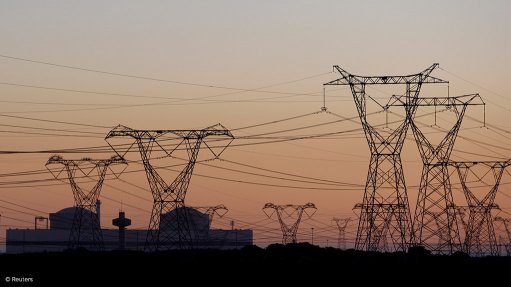
Photo by: Reuters
South Africa’s National Nuclear Regulator (NNR) is busy strengthening the country’s nuclear regulatory framework, in anticipation of the planned construction of a fleet of new nuclear power stations (NPPs). “As part of strengthening our capacity we recently launched a Centre for Nuclear Safety and Security (CNSS), housed at the University of Pretoria,” reported NNR CEO Mzubanzi Bismark Tyobeka on Wednesday. He was addressing the First NNR Regulatory Information Conference, in Pretoria.
“We are now developing a system of fines, to ensure rogue operators can be brought to book,” he pointed out. “We also vigorously developed our staff. We went through a staff-building exercise.” The NNR now has 143 employees, more than three-quarters of whom have postgraduate degrees. The agency has “rigorous training initiatives”, including with the International Atomic Energy Agency (IAEA), the European Union, and bilaterally with various countries.
The NNR also cooperates more broadly with the IAEA and has bilateral agreements with the nuclear regulatory agencies in China, Finland, France, (South) Korea, Russia, the UK and the US. (All these regulators, except Korea, were represented at the NNR conference.) NNR staff serve on IAEA safety standards committees and have taken part in a number of IAEA Integrated Regulatory Review Service missions, most recently to Finland, Japan, Pakistan and Sudan.
“Very important is the issue of regulatory independence,” he stressed. This has three main aspects: political independence, financial independence and technical independence.
Political independence means that the regulator has the ability to take regulatory decisions without political interference and possesses the ability to give independent advice to governments and government departments. Financial independence means that the regulator always has sufficient and assured financial resources. Technical independence means that the regulator possesses its own, in-house, expertise.
It is to ensure technical independence that the NNR has two radio-analytical laboratories, one in Cape Town and the other in Pretoria. These allow the regulator to make its decisions on the basis of its own analyses.
In the next few years, the NNR is going to be giving attention to a number of important policies and programmes. These are: expanding the mandate of the NNR to include the regulation of medical radioactive sources; licensing the new NPP building projects; and staffing and making operational the CNSS. Furthermore, the possibility of transferring the regulation of safeguards from the South African Nuclear Energy Corporation to NNR is being explored.
“A firm foundation has been laid over the past years to put in place a regulatory framework that strengthens the NNR’s mandate,” concluded Tyobeka.